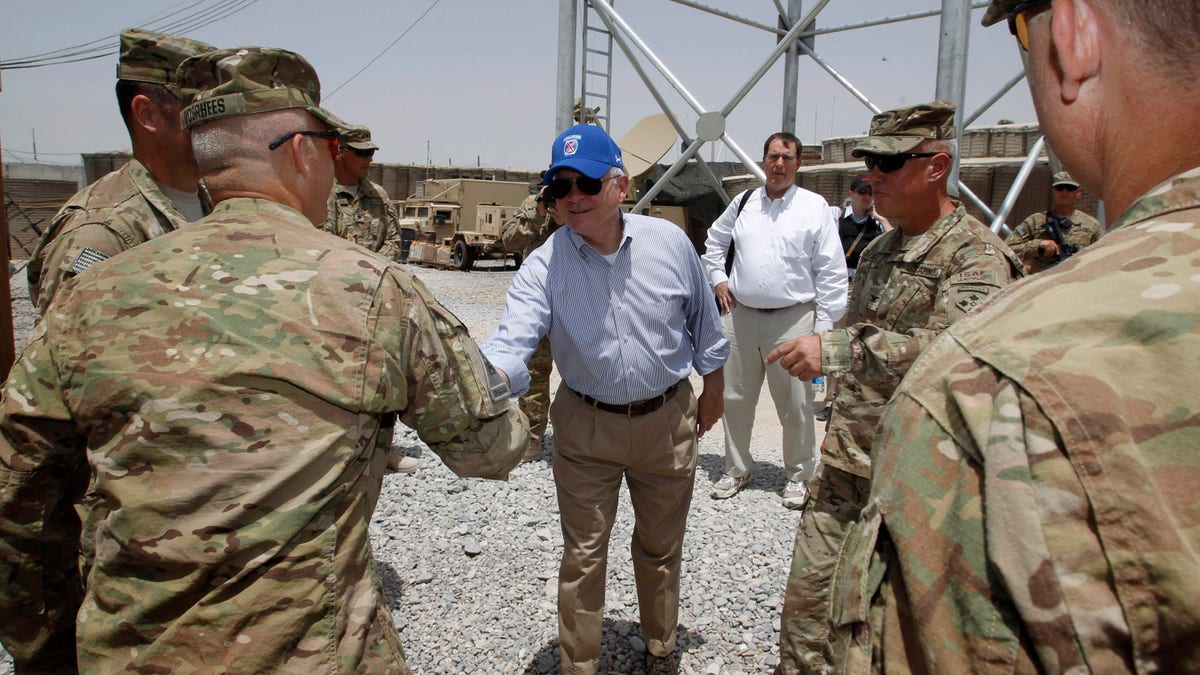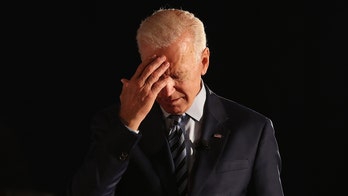
Sunday: Defense Secretary Robert Gates thanks troops at Forward Operating Base (FOB) Walton in Kandahar, Afghanistan.
Roughly 800 troops will leave Afghanistan next month -- and they won't be replaced -- raising suspicions that the wheels for President Obama's long-awaited July 2011 drawdown have already been set in motion.
In his final press conference at the Pentagon Thursday, Defense Secretary Robert Gates acknowledged that a decision was made in Washington not to send replacement units for fears that the troops would have to be redeployed when Obama makes his drawdown decision at the end of the month.
Gates said that Afghan commander Gen. David Petraeus recommended the move based on the expectation these units would be some of the first to go.
"As General Petraeus was looking across Afghanistan and beginning to identify different options, it was pretty clear that these two units were units that would probably be on that list. And so we took the decision here as the chairman has just said to divert them so that we didn't end up putting them someplace and then pulling them right back out again," Gates said.
The quiet maneuver was first noticed by Sen. Jim Inhofe, R-Okla., a senior member of the Senate Armed Services Committee, who began receiving complaints from members of the Oklahoma National Guard's 45th Infantry Brigade Combat Team about their sudden change in mission.
Inhofe's office told Fox News that members of the 45th, who'd been preparing for months for an Afghan army training mission, were disappointed to learn they'd been reassigned to Kuwait, where they'll provide security for U.S. forces leaving Iraq.
The unit even took the time to learn Pashtu, the local Afghan dialect. The units they were to replace were based both in Eastern Afghanistan and Kabul.
"The last minute nature of the re-missioning of two battalions to Kuwait has impacted their training and deployment," Inhofe said in a statement.
"We must ensure we have the forces properly trained and in place to execute our missions in Afghanistan, Iraq and Kuwait. Last minute re-taskings unnecessarily increase risk. As Secretary Gates and our military commanders have made clear, the progress we have made in Afghanistan, which I saw firsthand earlier this year, is fragile and reversible. Any major change could destroy all progress made to date, and we must not allow that to happen."
Inhofe went on to say the members of the 45th believe strongly that "their re-missioning is part of a drawdown in Afghanistan, even though an assessment from the General Petraeus is still outstanding."
Petraeus, in town for his confirmation hearing next week, is carrying with him recommendations and options for how many troops the president could draw down.
Sitting alongside Gates, Joint Chiefs of Staff Chairman Admiral Mike Mullen argued this move is not part of the administration's drawdown. He admitted that Petraeus identified the 45th as part of the units no longer needed in light of the president's request, but said explicitly that the president's drawdown "has not begun."
Meanwhile in Pakistan, elected officials with known ties to the Taliban -- anticipating a drawdown like they saw coming out of Iraq last summer -- told Fox News that the Taliban's strategy is to wait the Americans out and to hold back its fighting to give the U.S. a false sense of security.
Those same officials said the Taliban would then attempt to seize heavy U.S. weapons as America pulls out and use those weapons to overthrow the government in Kabul when the US is gone. U.S. military officials say the Taliban can try but much of that equipment will be flown out.




